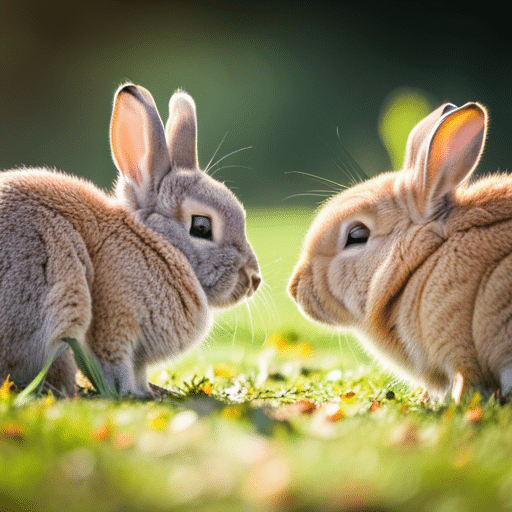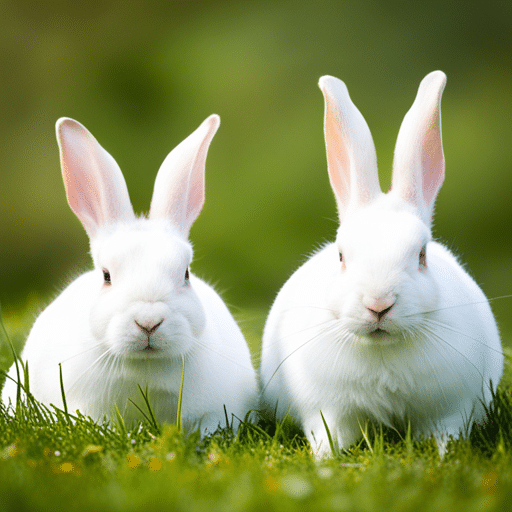A common question posed by rabbit owners and potential adopters is whether there are differences between male and female rabbits. The answer, in short, is yes—there are distinct differences between males and females when it comes to rabbits. Knowing these differences can help prospective pet parents decide what kind of rabbit would best fit their lifestyle. This article will discuss some of the most common distinctions between male and female rabbits.
Short Summary
Male and female rabbits exhibit distinct physical and behavioral differences. Males usually have larger heads, longer ears, and feet, while females have rounder faces.
Males are often more independent and confident, making them a potentially better choice for those wanting an outgoing pet. Females can be shy, which may suit those who prefer quieter pets.
Female rabbits are typically larger due to a higher metabolism and increased food consumption.
Regardless of gender, it’s crucial to neuter or spay your rabbit to prevent unwanted pregnancies and potential health issues.
When choosing a rabbit as a pet, one’s personal preferences, the rabbit’s characteristics, and your commitment to proper care and nutrition should all be taken into consideration.
Rabbits, like most animals, have distinct genders that come with unique characteristics. When it comes to domestic rabbits though, males and females differ in several ways – from temperament and size to health risks. To help potential pet owners better understand both genders of rabbits, let’s review some of the key differences between male and female rabbits.
Why Do You Need to Know the Sex of Your Rabbits?

Knowing the sex of your rabbits can be an important factor to consider when deciding whether or not to adopt one, as well as how you will care for it. Differences in size and temperament between male and female rabbits are two of the main reasons why it’s important to know what gender rabbit you have before bringing them home. In addition, some medical treatments can only be performed on male rabbits – such as neutering, which we’ll discuss later.
Male and Female Rabbits Have Different Temperaments
When it comes to personality, there are a few distinct distinctions between male and female rabbits. Male bunnies tend to be more confident and independent, while female rabbits are typically more timid and shy. If you’re looking for an outgoing rabbit that loves attention, a male might be the better fit. But if you’re looking for a quieter and more low-maintenance pet, then a female bunny may be your best bet.
Females Tend to Be Larger Than Males
In terms of size, there is often quite a difference between males and females. On average, female rabbits tend to be larger than males. This could be due to the fact that females have a higher metabolism and consume more food than their male counterparts. If you’re looking for a bigger rabbit or larger rabbits, then you may want to opt for a female.
Male Rabbits Are Generally Easier to Neuter
When it comes to spaying or neutering, male rabbits are generally easier to neuter than female rabbits. While most rabbits of both genders must be spayed or neutered to prevent unwanted pregnancies, the process of neutering a male is often less invasive and expensive than that of spaying a female.
Females Can Develop Uterine Cancer if Not Spayed
Along with preventing unwanted pregnancies, neutering or spaying your rabbit is also important for their health. If left intact, female rabbits can develop uterine cancer and other reproductive diseases. Therefore, it’s essential that all female rabbits be spayed to ensure they stay healthy and safe.
Males Can Be Prone to Hormonal Imbalance
Male rabbits, while easier to neuter, can be prone to hormone imbalances if left unneutered. Male rabbits that are not neutered may exhibit behaviors such as aggression and territorial marking. Neutering your rabbit will help reduce or eliminate these behaviors and keep them safe from potential health risks associated with hormones.
Male vs Female Rabbits: Physical Differences

In addition to the differences in size physical appearance, temperament, and health risks outlined above, there are also some physical differences between males and females. Male rabbits tend to have larger heads than females, as well as longer ears and feet. Females typically have shorter and rounder faces, along with smaller ears and feet.
Digging habits
Rabbits also differ in their digging habits, with males being more likely to dig than females. It’s important that pet owners provide rabbits with a safe environment where they can dig and get exercise, as this is an essential part of their overall health and well-being. Providing your rabbit with plenty of hay and other healthy snacks will help keep them occupied and discourage them from digging up your furniture.
Frequently Asked Questions
Are male rabbits better pets than female rabbits?
The answer to this question depends on your preferences and your own personality as a rabbit owner. Generally, male rabbits are more independent and confident than female rabbits, so they may be a better fit for someone looking for an outgoing pet that loves attention. On the other hand, female rabbits tend to be shyer and lower-maintenance, making them a great choice for someone looking for a quieter pet.
Are male rabbits bigger than female rabbits?
Typically, adult rabbits, yes. Female rabbits tend to be larger than males on average due to their higher metabolism and increased food consumption. If you’re looking for a bigger rabbit, then opting for a female may be the way to go.
Are female rabbits easier to neuter than males?
No. Male rabbits are usually easier to neuter than females, as the process of neutering males is often less invasive and expensive compared to spaying a female rabbit. However, it’s important for both genders to be neutered or spayed in order to prevent unwanted pregnancies and potential health issues.
Do male or female rabbits live longer?
There is no significant difference in lifespan between male and female rabbits. However, the health of your rabbit can play a major role in its longevity. Make sure to provide your pet rabbits with proper nutrition, veterinary care, exercise, and enrichment activities to keep them happy and healthy for many years to come.
What happens if you don’t neuter/spay your rabbit?
If you don’t neuter or spay your rabbit, it can develop certain medical issues. In females, this includes developing uterine cancer and reproductive diseases. In males, it may lead to hormonal imbalances that can cause aggression and territorial marking. Therefore, it’s essential to have your rabbit spayed or neutered by a veterinarian in order to keep them safe and healthy.
How To Tell The Gender Of Baby Rabbits?
The easiest way to tell the gender of a baby rabbit is by looking at its genitals. The male’s genital opening will be located further away from his anus than that of the female. Also, males tend to have larger heads and feet than females. While these traits are not foolproof, they can help you distinguish between male and female rabbits in most cases.
It’s important to note that rabbits can reach sexual maturity as young as four months old, so it’s important to get them spayed or neutered as soon as possible in order to prevent unwanted pregnancies.
Are Male or Female Rabbits Easier to Train?
Both male and female rabbits can be trained, although males tend to be more independent and confident than females. This means that male rabbits may be a bit easier to train since they are less shy and more willing to take direction. However, training other rabbits or any pet rabbit requires patience and consistency in order for them to be successful.
Whether you choose a male rabbit or female rabbit, it’s important to provide them with plenty of enrichment activities and socialization in order for them to live a happy and healthy life.

Conclusion
When deciding between male and female rabbits, it’s important to consider the differences between them. Female rabbits tend to be larger than males, while males are generally easier to neuter. There are also differences in their personalities, with males being more independent and confident than females, which may make them easier to train.
No matter what gender you choose, it’s essential to get your rabbit spayed or neutered in order to prevent unwanted pregnancies and potential health issues. Additionally, providing plenty of enrichment activities and socialization will help keep your rabbit healthy and happy for years to come.
By understanding the differences between male and female rabbits, you can ensure that you make the best decision for your pet bunny. With proper nutrition, veterinary care, and love, your pet rabbit will be a part of your family in no time!



